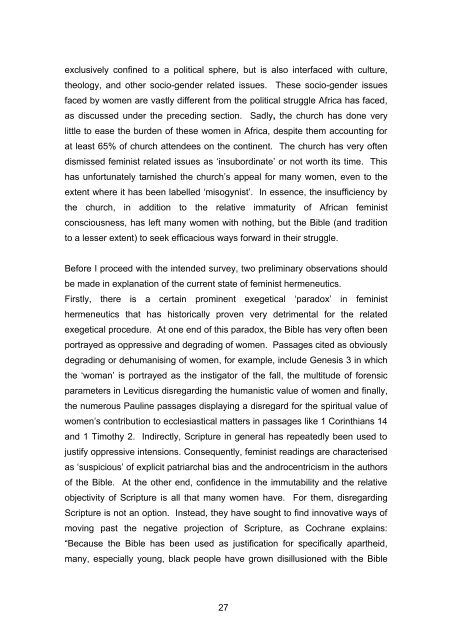African Hermeneutics: The Current State - Theology In Africa
African Hermeneutics: The Current State - Theology In Africa
African Hermeneutics: The Current State - Theology In Africa
You also want an ePaper? Increase the reach of your titles
YUMPU automatically turns print PDFs into web optimized ePapers that Google loves.
exclusively confined to a political sphere, but is also interfaced with culture,<br />
theology, and other socio-gender related issues. <strong>The</strong>se socio-gender issues<br />
faced by women are vastly different from the political struggle <strong>Africa</strong> has faced,<br />
as discussed under the preceding section. Sadly, the church has done very<br />
little to ease the burden of these women in <strong>Africa</strong>, despite them accounting for<br />
at least 65% of church attendees on the continent. <strong>The</strong> church has very often<br />
dismissed feminist related issues as ‘insubordinate’ or not worth its time. This<br />
has unfortunately tarnished the church’s appeal for many women, even to the<br />
extent where it has been labelled ‘misogynist’. <strong>In</strong> essence, the insufficiency by<br />
the church, in addition to the relative immaturity of <strong><strong>Africa</strong>n</strong> feminist<br />
consciousness, has left many women with nothing, but the Bible (and tradition<br />
to a lesser extent) to seek efficacious ways forward in their struggle.<br />
Before I proceed with the intended survey, two preliminary observations should<br />
be made in explanation of the current state of feminist hermeneutics.<br />
Firstly, there is a certain prominent exegetical ‘paradox’ in feminist<br />
hermeneutics that has historically proven very detrimental for the related<br />
exegetical procedure. At one end of this paradox, the Bible has very often been<br />
portrayed as oppressive and degrading of women. Passages cited as obviously<br />
degrading or dehumanising of women, for example, include Genesis 3 in which<br />
the ‘woman’ is portrayed as the instigator of the fall, the multitude of forensic<br />
parameters in Leviticus disregarding the humanistic value of women and finally,<br />
the numerous Pauline passages displaying a disregard for the spiritual value of<br />
women’s contribution to ecclesiastical matters in passages like 1 Corinthians 14<br />
and 1 Timothy 2. <strong>In</strong>directly, Scripture in general has repeatedly been used to<br />
justify oppressive intensions. Consequently, feminist readings are characterised<br />
as ‘suspicious’ of explicit patriarchal bias and the androcentricism in the authors<br />
of the Bible. At the other end, confidence in the immutability and the relative<br />
objectivity of Scripture is all that many women have. For them, disregarding<br />
Scripture is not an option. <strong>In</strong>stead, they have sought to find innovative ways of<br />
moving past the negative projection of Scripture, as Cochrane explains:<br />
“Because the Bible has been used as justification for specifically apartheid,<br />
many, especially young, black people have grown disillusioned with the Bible<br />
27


